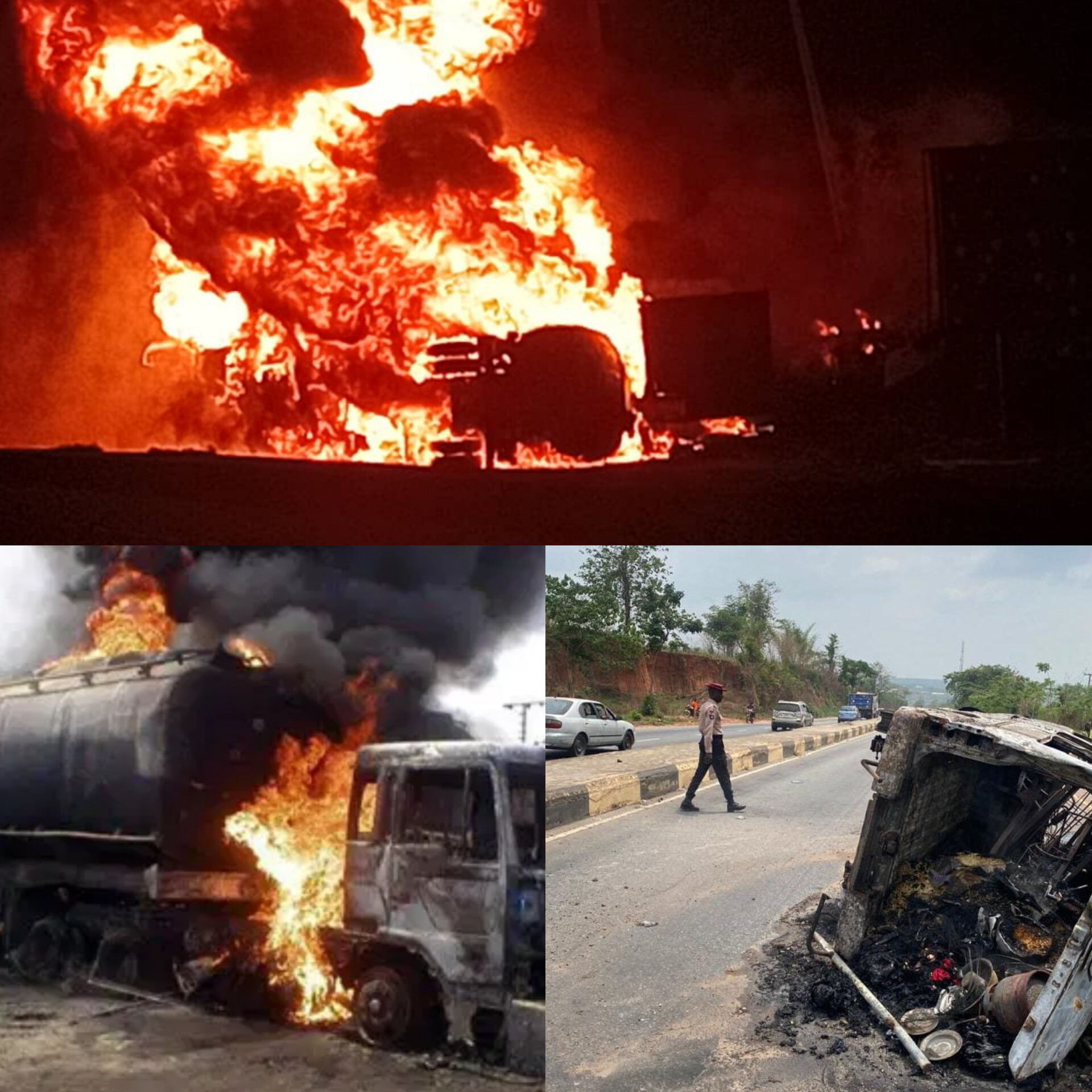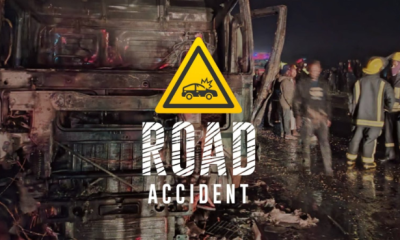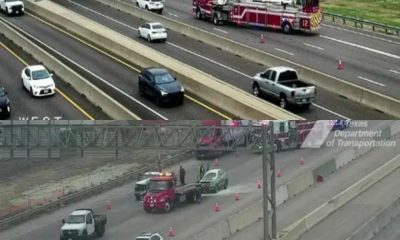Crash News
Tanker Explosion Kills 37 in Niger State as Residents Scoop Fuel from Fallen Truck

A horrifying fuel tanker explosion has left at least 37 people dead and several others critically injured in Aguwape community, near Lapai Local Government Area of Niger State, after residents attempted to scoop fuel from a fallen tanker.
Also Read: NEWS FLASH: Four Dead as Bus Collides With Trailer in Yobe State
The tragedy, which occurred in the early hours of Sunday, October 19, 2025, has once again drawn national attention to Nigeria’s persistent and deadly pattern of fuel scooping disasters.
According to eyewitnesses, the incident unfolded around 5:30 a.m. when a petrol-laden tanker en route from Lagos to Minna lost control while negotiating a sharp bend and overturned, spilling its highly flammable contents across the road and into nearby gutters.
Within minutes, dozens of villagers and passersby rushed to the scene with jerrycans, buckets, and bowls, scrambling to scoop the leaking fuel, a decision that turned fatal moments later.
Residents described chaotic scenes as the overturned tanker attracted crowds eager to collect the petrol before emergency responders could arrive.
“I warned them, but they wouldn’t listen,” said Aliyu Musa, a commercial motorcyclist who witnessed the explosion. “They said things are hard, that even if they die, their families would at least eat from what they sold. The fire started suddenly, I just saw flames and people running, burning, shouting for help.”
Another eyewitness, Hauwa Ibrahim, a shopkeeper near the scene, recounted how the tanker driver tried to stop people from approaching the vehicle but was ignored.
“The driver was crying. He told them fuel was leaking dangerously. But many didn’t care. Someone’s phone rang, and that was all it took. The whole place went up in flames,” she said.
Within seconds, a fireball engulfed the crowd, incinerating dozens instantly. Burned-out jerrycans, melted motorcycles, and the charred remains of victims littered the road by the time firefighters from the Federal Fire Service (FFS) and Niger State Emergency Management Agency (NSEMA) arrived.
Officials from the NSEMA confirmed that 37 bodies were recovered at the scene, while over 25 others sustained various degrees of burns and were rushed to the Lapai General Hospital and the Ibrahim Badamasi Babangida Specialist Hospital in Minna.
The Agency’s spokesperson, Hussaini Ibrahim, described the scene as “horrific and heartbreaking.”
“Most of the victims were young men and teenagers. We found remains scattered over 200 meters from the explosion site. Some victims were burnt beyond recognition,” he said.
He added that the rescue effort was hampered by the intensity of the flames, which took nearly four hours to extinguish completely.
“Our men had to retreat multiple times due to heat. The tanker carried over 33,000 liters of Premium Motor Spirit (PMS), and when it exploded, the impact destroyed nearby shops, a mosque, and several houses,” he said.
The Niger State Police Command confirmed the incident and has opened an investigation into the cause of the crash and subsequent explosion.
This disaster adds to Nigeria’s growing list of fuel scooping tragedies. From Osun (2022) to Rivers (2023) and Benue (2024), hundreds have died in similar preventable explosions after fuel tankers crash and residents rush to collect leaking petrol.
In 2024, a tanker explosion in Rivers State claimed over 50 lives, while another in Benue State killed 42, mostly women and children.
Despite numerous awareness campaigns by the Federal Road Safety Corps (FRSC) and National Emergency Management Agency (NEMA), locals continue to risk their lives in search of quick gains from spilled fuel.
According to data from the NBS and FRSC, Nigeria recorded over 950 tanker-related crashes between January 2022 and June 2025, resulting in more than 2,700 deaths.
Analysts attribute these tragedies to economic hardship, ignorance of danger, weak enforcement, and poor emergency management.
Sociologists and safety experts say incidents like the one in Lapai are deeply rooted in Nigeria’s worsening economic conditions.
With inflation at over 31% and unemployment among youth above 40%, many communities along tanker routes see fallen fuel tankers as an “opportunity.”
Dr. Ifeanyi Ojukwu, a transport safety analyst, told RoadKing.ng that desperation often overrides caution.
“People understand it’s dangerous, but poverty makes danger look like a chance. They know fuel can explode, but hunger burns faster. Until we address economic pressure and enforce strict safety education, these tragedies will continue,” he said.
Road safety advocates have long called for mobile safety patrols and public emergency alerts to quickly cordon off accident sites before residents intervene.
FRSC Reaction: “We Keep Warning, But People Still Rush to Death”
The FRSC Corps Marshal, Dauda Biu, expressed grief over the deaths and reiterated the agency’s frustration with recurring tanker fire tragedies.
“This loss of 37 Nigerians in one morning is unacceptable. We keep warning people not to scoop fuel, but every year we see the same thing. We will work with community leaders to intensify awareness in tanker corridors like Niger, Ogun, and Kogi,” Biu said in an official statement.
He emphasized that road users and locals must report tanker incidents immediately and stay at least 500 meters away from the crash site until professionals arrive.
Beyond the human toll, the explosion left significant infrastructural and environmental damage. The asphalt surface of the highway melted, nearby electric poles collapsed, and several vehicles parked around were reduced to ashes.
Environmental officials warn that leaked fuel has seeped into surrounding soil and water bodies, posing long-term contamination risks to the community. A cleanup and soil recovery process is now being planned by the Niger State Environmental Protection Agency (NISEPA).
The Niger State Governor, Mohammed Umar Bago, visited the site and declared three days of mourning for the victims. He described the incident as a national embarrassment and called for “immediate reform” in tanker safety and driver certification.
“We can’t continue like this. Tanker crashes and illegal scooping have killed more Nigerians than terrorism in some regions. I am calling on the Federal Government to introduce strict monitoring systems, driver re-certification, and fuel transport safety upgrades like the TankSafe™ casing innovation proposed recently,” he said, referencing ongoing advocacy by safety experts and innovators.
By midday, relatives of the victims gathered at the Lapai General Hospital, hoping to identify loved ones among the burned remains. Health officials confirmed that some victims were beyond recognition, and DNA testing might be required for proper identification.
Mass burial arrangements were underway for those who could not be identified, with clerics leading prayers and appeals for peace and restraint.
A Call to Action: Stop Scooping, Save Lives
As dusk fell over Lapai, the once-busy road lay silent, scarred, blackened, and still smoking in parts. Charred jerrycans and sandals scattered across the asphalt served as grim reminders of how quickly greed and poverty can ignite tragedy.
For Nigeria, the message remains the same: until safety awareness and economic intervention reach the grassroots, history will keep repeating itself, one tanker, one explosion, one community at a time.






















